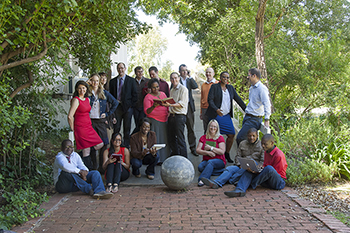Latest News Archive
Please select Category, Year, and then Month to display items

The University of the Free State (UFS) wishes to confirm that the following financial concessions have been made to enable students to register for the 2024 academic year:
- Students with confirmed NSFAS funding:
- Students with a confirmed National Student Financial Aid Scheme (NSFAS) funding allocation for 2024 with a debt of R20 000 and less may register fully without making any payments.
- First-time entering students (FTENS) with a confirmed NSFAS funding allocation for 2024 may register fully without any payments.
- Students with a confirmed NSFAS funding allocation for 2024 with a debt of R30 000 and less may register provisionally and pay the required fees* for provisional registration.
- South African self-paying (NON-NSFAS) students:
- SA students with a debt of up to R500 may register fully without making any payments.
- SA students with a debt of up to R30 000 may register provisionally and pay the required fees* for provisional registration.
- FTENS not on UFS funded list:
- Students who are not on the funded list but report that they have been approved on their portal must contact our
 Financial Aid Offices urgently so that the university can escalate to NSFAS.
Financial Aid Offices urgently so that the university can escalate to NSFAS.
The university will have continuous engagement with the National Financial Aid Scheme (NSFAS) to resolve outstanding matters. The university’s Financial Working Group (FWG) will meet regularly to determine how it can best assist students taking into consideration the financial constraints of the university.
Prestige Scholars Programme invests in promising academics
2015-06-24

Photo: Sonia Small |
Whilst many academics find it challenging to have sustainable funding for specific projects, it is often just as challenging to find relevant exposure and good mentorship programmes to fully prepare academics toward becoming full professors.
Prof Jonathan Jansen, Vice-Chancellor and Rector of the UFS, designed the Vice-Chancellor’s Prestige Scholars Programme (PSP) specifically targeting newly-completed post-doctoral students who are already members of the academic staff.
The goal is to select the most promising young scholars and to make substantial institutional investment in their development.
To date, the PSP has produced 2 Fulbright scholars; 10 National Research Foundation (NRF) rated scholars; 1 NRF Blue Skies research project and 14 NRF Thuthuka-funded projects. These scholars work with the best academics at leading universities on three continents.
Prof Jackie du Toit, co-director of the programme, explains that while the PSP does not provide funding, it is a great programme to empower scholars by means of assistance towards generating funding from outside sources.
Prof Du Toit co-directs this programme with Proff Corli Witthuhn, Vice-Rector: Research and Niel Roos from the Department of Africa Studies.
“The PSP bases its approach to funding on the philosophy that young scholars are to be encouraged towards financial independence, based on a viable postdoctoral project that would sustain their scholarship for five to eight years post PhD. We believe that the cachet and long-term sustainability of existing funding programmes such as Fulbright outweighs the short-term benefits of automatic funding from the PSP. We also endeavour to teach young scholars to work cleverly within institutional parameters, rather than leave them floundering once they step off the active PSP.”